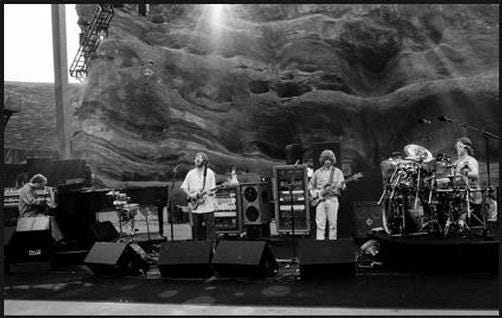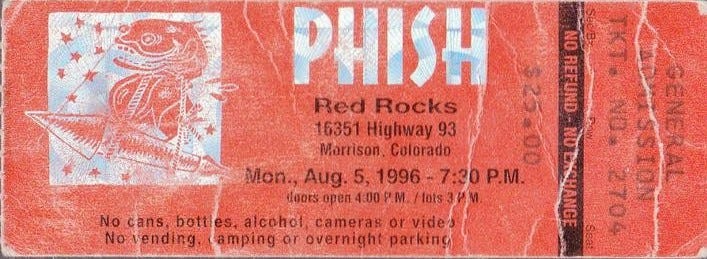Delayed Release
8/5/96, Morrison, CO, Red Rocks Amphitheatre
SET 1: Wilson > Poor Heart > Guelah Papyrus, Divided Sky, Wolfman's Brother, Foam, If I Could, Julius, The Squirming Coil
SET 2: Also Sprach Zarathustra > Down with Disease -> It's Ice, Halley's Comet, Somewhere Over the Rainbow, Waste, Talk, Train Song, Strange Design, Amazing Grace, Mike's Song > I Am Hydrogen > Weekapaug Groove
ENCORE: Cavern
The night after a somewhat uninspiring rerun, Phish made some tentative moves towards the refresh of their sound that they possibly weren’t quite sure they needed yet. As usual with Phish, the transformations sprout from new equipment, and the new approaches they inspire — we’re seeing it yet again in 2021. But the innovations of 1996 are notable for just how long they took to ripen; it’s later years of Phish that will benefit from this year’s innovation.
Trey Steps Back
For the second time already this year, Down With Disease provides the rare opportunity for open jamming, here with a nearly 17-minute version that picks up where the impressive Hamburg version left off. As on 7/23, the jam is notable for Trey’s insistence on playing more of a rhythmic role after moving off of the riff at the end of the song proper. He toys around with a fairly simple repeating melody (reminiscent of Os Mutantes’ ”Bat Macumba”) at the outset, but around 8:30 he switches to chording, sustains, and the occasional quick fill that challenges the rest of the band to step up.
They edge around the idea of closing the song, but opt to quiet it down instead, and at 12:00 there is a very prophetic minute of cowfunk, complete with an extremely Weymouth-esque bassline. But just as they seem so tantalizingly close to making the breakthrough to the next year’s defining sound, Trey switches to his mini-kit, now a fixture of the band’s stage gear for over a year, where he spends the rest of the song before leading the band into It’s Ice.
It’s frustrating, yeah, but it’s also a logical progression; the whole point of Trey’s mini-kit, when first introduced, was to release him from the responsibility of conducting the band, giving his bandmates the opportunity to steer the ship. In 1995 it mostly turned up in the usual places — the middle of Free, Page’s solo in Suzy — but in 1996 it’s starting to show up less predictably, at stages of jams where Trey wants to hand over the reins. Seven months or so from now, they’ll figure out that the minute before that switch to percussion is a much more effective strategy for encouraging band democracy, rendering the mini-kit unnecessary.
Handwaving
The first sound fans heard on Phish’s summer tour was the high-pitched wobbly tone of Page’s new toy, Leon Theremin’s magical electronic box. Played by moving one’s hands through the electromagnetic fields generated by two antennae controlling volume and pitch, the instrument’s ghostly glissandos can be heard in everything from B-movie horror to classical music to “Good Vibrations.” In the summer of 1996, Page mostly used it as a novelty, playing “Somewhere Over The Rainbow” or the theme from Star Trek — not very crisply — to open shows or encores.
But tonight, that howling drone pops up in a proper jam: the last minute of a disintegrating Halley’s Comet, elbowing some Trey noise loops out of the way before segueing into a solo, and more complete than 8/2, “Rainbow.” It’s quickly apparent that this Theremin break is a cover for the tech setup needed for our next section, but it’s still a fun glimpse at a second Summer of Theremin, a mere 15 years in the future.
More immediately, this noisy stretch joins another promising moment at Set 2’s opening, when after Fish sneers “we’re louder than you,” the band pulls out all their noisy tricks, sans Theremin, in a 2-minute long intro to 2001. It’s an indication that we are so close, so close, to the once-gimmicky set opener stretching out into a far more interesting launchpad, but it also foreshadows the spacier excursions of 97 and beyond. You can’t credit it all to the Theremin, but the sound of the USS Enterprise surely couldn’t have hurt.
Acoustic Armistice
That segment that Page is killing time for turns out to be the very first acoustic Phish mini-set of a trio in Summer 1996. The new setup is a tone shift from the bluegrass lineup of the last two years, with no instrument swaps or washboards shaped like Madonna’s cone bra. It’s also an entirely different staging, with Trey and Mike on stools, Fishman on a minimized drum kit, and Page playing an upright piano all crammed together in a tiny little spotlit space.
Perhaps even more jarring is the material played in this unusual setup, including three songs written and recorded for Billy Breathes (Waste, Talk, Train Song) and one left on the cutting room floor (Strange Design). These aren’t Appalachian throwbacks, arch rearrangements of prog-rock classics, or even somewhat inscrutable ballads such as Dog-Faced Boy. These are straight up earnest tear-jerkers for your junior high slow dance, a song type Phish had delicately dabbled in but never fully committed to. Mike, in two years and one album, went from writing Scent of a Mule to writing Train Song, for Pete's sake.
It’s a jarring leap from last year’s perennial Acoustic Army, which appeared to satirize the very acoustic-guitars-and-stools format they were now embracing without irony. And it would set the tone for a lot of Phish songwriting over the next 25 years, accelerating into Trey’s current obsession with souls and global togetherness or whatever. While Phish Unplugged didn’t really stick after 96 (apart from the Bridge Benefit sets in 98, a random mini-stage revival on 12/28/98, and the pleasant afternoon set at Festival 8), this group of songs added a new stripe to the emotional rainbow of the Phish experience; I can’t imagine crying at a pre-96 Phish show except out of disbelief, while I have definitely sobbed my ass off at shows in 3.0.
By the end of the year, all three of these elements would be mostly gone and forgotten. Trey retired the mini-kit, the acoustic stage proved too much fuss and mid-set disruption to set up and breakdown, and Page would only bring out his Theremin for special occasions. But they all broke ground that Phish would continue to explore, using newer gear and more direct songwriting. For a year marked so far by indecision, they’re promising, if shaky, first steps in a couple new directions.




